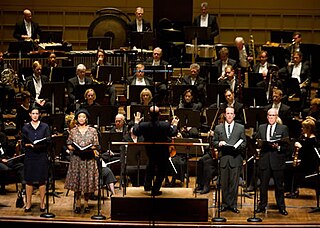Related Research Articles

Frank Martin was a Swiss composer, who spent much of his life in the Netherlands.

Robert Eugene Ward was an American composer who is best remembered for his opera The Crucible (1961) after the 1953 play of the same name by Arthur Miller. He was awarded the Pulitzer Prize for Music for that opera in 1962.
John Harris Harbison is an American composer and academic.

Steven Edward Stucky was a Pulitzer Prize-winning American composer.
John Maynard La Montaine, also later LaMontaine, was an American pianist and composer, born in Oak Park, Illinois, who won the 1959 Pulitzer Prize for Music for his Piano Concerto No. 1 "In Time of War" (1958), which was premiered by Jorge Bolet.
Yehudi Wyner is an American composer, pianist, conductor and music educator.
Hendrik Pienaar Hofmeyr is a South African composer. Born in Cape Town, he furthered his studies in Italy during 10 years of self-imposed exile as a conscientious objector. While there, he won the South African Opera Competition with The Fall of the House of Usher. He also received the annual Nederburg Prize for Opera for this work subsequent to its performance at the State Theatre in Pretoria in 1988. In the same year, he obtained first prize in an international competition in Italy with music for a short film by Wim Wenders. He returned to South Africa in 1992, and in 1997 won two major international composition competitions, the Queen Elisabeth Music Competition of Belgium and the first edition of the Dimitris Mitropoulos Competition in Athens. His 'Incantesimo' for solo flute was selected to represent South Africa at the ISCM World Music Days in Croatia in 2005. In 2008 he was honoured with a Kanna award by the Kleinkaroo National Arts Festival. He is currently Professor and Head of Composition and Theory at the South African College of Music at the University of Cape Town, where he obtained a DMus in 1999.
Raymond Wilding-White ; was an American composer of contemporary classical music and electronic music, and a photographer/digital artist.
Christopher Marshall is a New Zealand classical music composer who resides in Orlando, Florida, United States.
Philip Lasser is an American composer, pianist, and music theorist. He is a member of the faculty at the Juilliard School in New York City.
Philip Bračanin is an Australian composer and musicologist.
William Mayer was an American composer, best known for his prize-winning opera A Death in the Family.
Bernard Howard Gilmore was an American composer, conductor, French horn player, and Professor Emeritus of music at the University of California, Irvine. He is best known for his compositions, including Five Folk Songs for Soprano and Band which has become a reputable work in contemporary band music repertoire.

Kim André Arnesen is a Norwegian composer. He grew up in Trondheim, Norway and was educated at the Music Conservatory of the Norwegian University of Science and Technology. He is mostly known for his choral compositions, both a cappella, accompanied by piano or organ, or large-scale works for chorus and orchestra. His first CD album "Magnificat" was nominated for Grammy Awards 2016 in the category Best Surround Sound Album. He has received wide notice with his choral works that has been performed by choirs all over the world. His "Cradle Hymn" was a part of the regional Emmy Prize winning show "Christmas in Norway". Arnesen is an elected member of the Norwegian Society of Composers.
Christopher Cerrone is an American composer based in New York City. He was a 2014 finalist for the Pulitzer Prize, a 2014 Fromm Foundation commission recipient, a 2015 Rome Prize winner in Music Composition, and has received numerous awards from ASCAP.
Charles Clement Fussell is an American composer and conductor of contemporary classical music. He has composed six symphonies and three operas. His symphony Wilde for solo baritone and orchestra, based on the life of Oscar Wilde and premiered by the Newton Symphony Orchestra and the baritone Sanford Sylvan in 1990, was a finalist for the 1991 Pulitzer Prize for Music. He received a citation and award from the American Academy of Arts and Letters in 1992.
The Symphony No. 5 is a composition for baritone, mezzo-soprano, and orchestra by the American composer John Harbison. The work was commissioned by the Boston Symphony Orchestra under the conductor James Levine. It was given its world premiere in Boston on April 17, 2008, by the mezzo-soprano Kate Lindsey, the baritone Nathan Gunn, and the Boston Symphony Orchestra directed by James Levine. The text of the piece is set to Orpheus and Eurydice by Czesław Miłosz, Relic by Louise Glück, and the Sonnets to Orpheus by Rainer Maria Rilke.
The Requiem is a composition for soprano, mezzo-soprano, tenor, baritone, chorus, and orchestra by the American composer John Harbison. Composed over a period of seventeen years, the complete work was finished in 2002 on a commission from the Boston Symphony Orchestra. Its world premiere was given by the soprano Christine Brewer, mezzo-soprano Margaret Lattimore, tenor Paul Groves, baritone Jonathan Lemalu the Tanglewood Festival Chorus, and the Boston Symphony Orchestra under the direction of Bernard Haitink on March 6, 2003.
Richard Gibson is a Canadian composer of contemporary classical music, and Professor of Composition at the Université de Moncton in New Brunswick.
References
- 1 2 3 Harbison, John (1986). "The Flight into Egypt, Sacred Ricercar". G. Schirmer Inc. Retrieved December 27, 2015.
- ↑ "Tribun's Gorner, Lyon Win Pulitzer". Chicago Tribune . April 17, 1987. Archived from the original on February 19, 2014. Retrieved December 27, 2015.
- ↑ Freedman, Samuel G. (April 17, 1987). "Story of Black Life in 1950s Captures Pulitzer for Drama". The New York Times . Retrieved December 27, 2015.
- 1 2 Shulgold, Marc (April 18, 1987). "Composer's Pulitzer Surprise". Los Angeles Times . Retrieved December 27, 2015.